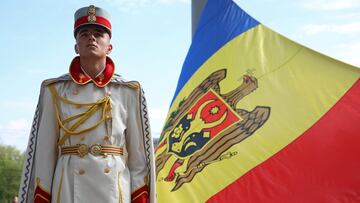Russia and Ukraine conflict: Is there a real risk of an invasion of Moldova?
One of Europe’s poorest nations has taken in a huge number of refugees but may soon find see the same situation if Russia crosses the Dniestr river.

There are fears in some quarters that Moldova’s position on the western border of Ukraine, both having been constituent parts of the Russian Empire and Soviet Union, leaves it at risk of a Russian invasion. It has all the hallmarks of the situation in Ukraine back in January; a large Russian speaking minority, breakaway states, and Russian troops guarding these lands.
What are the risks Moldova faces, and what has been the rhetoric coming out of Russia about further escalation of the conflict?
Moldova at the gates of east and west
Despite the Russian withdrawal from central Ukraine last month, the pressure exerted on the east has yet to let up. Mariupol, a city annihilated, is having its last defenders defeated as this article is written and other cities like Odessa are at risk of further attack. The Russian aim of the linking of Russian speaking territories will guide Russian troops towards Moldova along the Black Sea, specifically towards the area of Transdniestr in Moldova. This region is important as it has a Russian speaking population that broke away from Moldovan rule in 1991 at the fall of the Soviet Union.
Russia also has a long-standing strategic interest in Moldova. A former part of the Soviet Union, Russia has long had a sway on its politics in the same way it has had in the past in Ukraine. However, the current government of Moldova has made overtures to joining the European Union, especially since the outbreak of war in Ukraine where it applied for membership on March 3.
A recently published paper by the Royal United Services Institute (RUSI) titled Operation Z: The death throes of an imperal delusion goes into further depth on the relationship between Moldova and Russia. It argues that the FSB, the Russian secret service, has been involved in destabilising Moldova in the last year in preparation for invasion. Specifically, the upcoming celebrations for the end of the Second World War, known in Russia as the ‘Great Patriotic War’, could be used as a tool to argue that the Moldovan government is cracking down on Russian expression. This was the excuse Russia gave for invading Ukraine, saying that Russians were being discriminated against by the Ukrainain government.
“If a process of protest and repression, provocation and response, can be established, the hope is to foment political crisis. This may or may not succeed; it depends on how the Moldovan authorities behave. Tragically – as in Ukraine – the perception of declining influence appears to be pushing the Russians to take greater risks”, the report states.
The Moldovan government has noted heightened protests from Russian speakers in the country. At a recent meeting with the head of the European Council Charles Michel, Moldovan President Maia Sandu said, “We see no imminent threat for the nearest future, but of course we have contingency plans for such scenarios, which are less optimistic or which are pessimistic.”
The EU has recognised the threat Moldova is under and has said that Moldova’s application is “complex”, though the bloc is working to tighten realtions.
Indeed The Times in the UK reported on May 1 that the Ukrainian military believes the decision has “already been made” for Russia to attack Moldova. And with rhetoric coming out of Russia like the Deputy Head of the State Duma saying, “This is a metaphysical clash between the forces of good and evil... This is truly a holy war we’re waging and we must win”.
While an attack on Moldova would be difficult, Russia has just a brigade’s worth of troops in the country, it is by no means out of the question. The more desperate the Russian government gets, the less predictable its actions would be.






